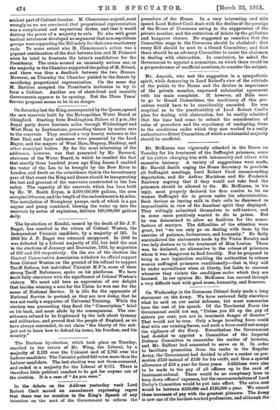Mr. McKenna was vigorously attacked in the Rouse on Tuesday
for his treatment of the Suffragist prisoners, some of his critics charging him with inhumanity and others with excessive leniency. A variety of suggestions were made, Mr. Harold Smith urging the Home Secretary to proclaim all Suffragist meetings, Lord Robert Cecil recommending deportation, and Sir Arthur Markham and Sir Frederick Banbury arguing that if they would not take food the prisoners should be allowed to die. Mr. McKenna, in his reply, most properly declared his firm resolve to let no woman Suffragist die in prison under his administration. Such devices as leaving milk in their cells he dismissed as impracticable in view of the fanatical spirit they displayed. They willingly submitted themselves to self-torture, and in some cases positively wanted to die in prison. But he was determined to allow no facilities for the manu- facture of martyrs. The difficulties of the situation were great, but " we can only go on dealing with them by the exercise of patience, forbearance, and humanity." He flatly contradicted the statements made by Sir Victor Horsley and two lady doctors as to the treatment of Miss Lenton. There was, he declared, no alternative to the release of prisoners whom it was dangerous to feed forcibly. But he proposed to bring in new legislation enabling the authorities to release woman suffragist prisoners conditionally—that is, they will be under surveillance when at liberty, but liable to rearrest whenever they violate the conditions under which they are licensed. In our opinion Mr. McKenna has carried through a very difficult task with good sense, humanity, and firmness.














































 Previous page
Previous page